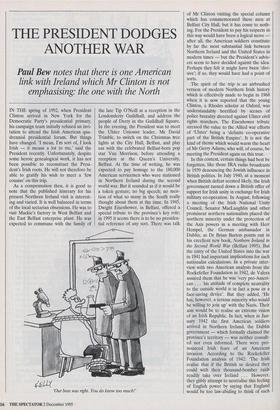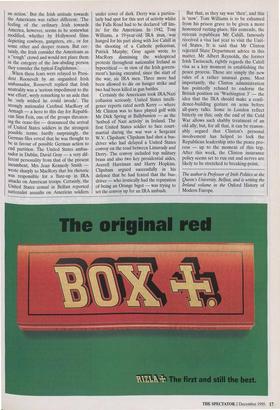THE PRESIDENT DODGES ANOTHER WAR
Paul Bew notes that there is one American link with Ireland which Mr Clinton is not emphasising: the one with the North IN THE spring of 1992, when President Clinton arrived in New York for the Democratic Party's presidential primary, his campaign team initially refused an invi- tation to attend the Irish American qua- drennial presidential forum. But things have changed. 'I mean, I'm sort of, I look Irish — it means a lot to me,' said the President recently. Unfortunately, despite some heroic genealogical work, it has not been possible to reconstruct the Presi- dent's Irish roots. He will not therefore be able to gratify his wish to meet a 'few cousins' on this trip.
As a compensation then, it is good to note that the published itinerary for his present Northern Ireland visit is interest- ing and varied. It is well balanced in terms of the local sectarian obsessions. He was to visit Mackie's factory in West Belfast and the East Belfast enterprise plant. He was expected to commune with the family of the late Tip O'Neill at a reception in the Londonderry Guildhall, and address the people of Deny in the Guildhall Square. In the evening, the President was to meet the Ulster Unionist leader, Mr David Trimble, to switch on the Christmas tree lights at the City Hall, Belfast, and play sax with the celebrated Belfast-born pop star Van Morrison, before attending a reception at the Queen's University, Belfast. At the time of writing, he was expected to pay homage to the 180,000 American servicemen who were stationed in Northern Ireland during the second world war. But it sounded as if it would be a token gesture; no big speech; no men- tion of what so many in the South really thought about them at the time. In 1945, Dwight Eisenhower, in Belfast, offered a special tribute to the province's key role; in 1995 it seems there is to be no presiden- tial reference of any sort. There was talk `Our boss was right. You do know too much!' of Mr Clinton visiting the special column which has commemorated these men at Belfast City Hall, but it has come to noth- ing. For the President to pay his respects in this way would have been a logical move after all, the American soldiers constitute by far the most substantial link between Northern Ireland and the United States in modern times — but the President's advis- ers seem to have decided against the idea. Perhaps they felt it might have been 'divi- sive'; if so, they would have had a point of sorts.
The spirit of the trip is an airbrushed version of modern Northern Irish history which is effectively made to begin in 1968 when it is now reported that the young Clinton, a Rhodes scholar at Oxford, was understandably horrified by scenes of police brutality directed against Ulster civil rights marchers. The Eisenhower tribute stressed the value to the Allied war efforts of 'Ulster' being a 'definite co-operative part of the British Empire'. It is not the kind of theme which would warm the heart of Mr Gerry Adams, who will, of course, be meeting the President again on this tour.
In this context, certain things had best be forgotten, like those IRA radio broadcasts in 1939 denouncing the Jewish influence in British politics. In July 1940, at a moment when British defeat seemed likely, the Irish government turned down a British offer of support for Irish unity in exchange for Irish military co-operation. In August, following a meeting of the Irish National Unity Council, Senator MacLaughlin and other prominent northern nationalists placed the northern minority under the protection of the Axis powers in a meeting with Herr Hempel, the German ambassador in Dublin, as Dr Brian Barton points out in his excellent new book, Northern Ireland in the Second World War (Belfast 1995). But the entry of the United States into the war in 1941 had important implications for such nationalist calculations. In a private inter- view with two American analysts from the Rockefeller Foundation in 1942, de Valera assured them that he was 'very pro-Ameri- can . . . his attitude of complete neutrality to the outside world is in fact a pose or a face-saving device'. But they added, 'He has, however, a serious minority who would be willing to join up' with the Nazis. Their aim would be to realise an extreme vision of an Irish Republic. In fact, when in Jan- uary 1942 the first American soldiers arrived in Northern Ireland, the Dublin government — which formally claimed the province's territory — was neither consult- ed nor even informed. There were pro- nounced Irish fears of an American invasion. According to the Rockefeller Foundation analysis of 1942: 'The Irish realise that if the British so desired they could with their thousand-bomber raids readily take over Ireland . . . However, they glibly attempt to neutralise this feeling of English power by saying that England would be too law-abiding to think of such an action.' But the Irish attitude towards the Americans was rather different: 'The feeling of the ordinary Irish towards America, however, seems to be somewhat modified, whether by Hollywood films depicting cowboys, gangsters, etc., or for some other and deeper reason. But cer- tainly, the Irish consider the Americans as a "tough" crowd and would not place them in the category of the law-abiding person they consider the typical Englishman.'
When these fears were relayed to Presi- dent Roosevelt by an anguished Irish ambassador, Roosevelt replied that Irish neutrality was a 'serious impediment to the war effort', wryly remarking to an aide that he 'only wished he could invade'. The strongly nationalist Cardinal MacRory of Armagh — a hero to this day for Republi- can Sinn Fein, one of the groups threaten- ing the cease-fire — denounced the arrival of United States soldiers in the strongest possible terms; hardly surprisingly, the German files reveal that he was thought to be in favour of possible German action to end partition. The United States ambas- sador in Dublin, David Gray — a very dif- ferent personality from that of the present incumbent, Mrs Jean Kennedy Smith — wrote sharply to MacRory that his rhetoric was responsible for a flare-up in IRA attacks on American troops. Certainly, the United States consul in Belfast reported nationalist assaults on American soldiers under cover of dark. Deny was a particu- larly bad spot for this sort of activity whilst the Falls Road had to be declared 'off lim- its' for the Americans. In 1942, Tom Williams, a 19-year-old IRA man, was hanged for his part along with Joe Cahill in the shooting of a Catholic policeman, Patrick Murphy; Gray again wrote to MacRory dismissing the widespread protests throughout nationalist Ireland as hypocritical — in view of the Irish govern- ment's having executed, since the start of the war, six IRA men. Three more had been allowed to die on hunger strike and two had been killed in gun battles. Certainly the Americans took IRA/Nazi collusion seriously. United States intelli- gence reports rated north Kerry — where Mr Clinton was to have played golf with Mr Dick Spring at Ballybunion — as the `hotbed of Nazi activity' in Ireland. The first United States soldier to face court- martial during the war was a Sergeant W.V. Clipsham; Clipsham had shot a bus- driver who had delayed a United States convoy on the road between Limavady and Deny. The convoy included top military brass and also two key presidential aides, Averell Harriman and Harry Hopkins. Clipsham argued successfully in his defence that he had feared that the bus- driver — who ironically had the reputation of being an Orange bigot — was trying to set the convoy up for an IRA ambush. But that, as they say was 'then', and this is 'now'. Tom Williams is to be exhumed from his prison grave to be given a more honoured resting-place. His comrade, the veteran republican Mr Cahill, famously received a visa last year to visit the Unit- ed States. It is said that Mr Clinton rejected State Department advice in this matter. Mr Albert Reynolds, the former Irish Taoiseach, rightly regards the Cahill visa as a key moment in establishing the peace process. These are simply the new rules of a rather unusual game. Most importantly, the Clinton administration has pointedly refused to endorse the British position on 'Washington 3' — the idea that the IRA should make a confi- dence-building gesture on arms before all-party talks. Some in London reflect bitterly on this; only the end of the Cold War allows such shabby treatment of an old ally; but, for all that, it can be reason- ably argued that Clinton's personal involvement has helped to lock the Republican leadership into the peace pro- cess — up to the moment of this trip. After this week, the Clinton insurance policy seems set to run out and nerves are likely to be stretched to breaking-point.
The author is Professor of Irish Politics at the Queen's University, Belfast, and is writing the Ireland volume in the Oxford History of Modern Europe.











































































 Previous page
Previous page